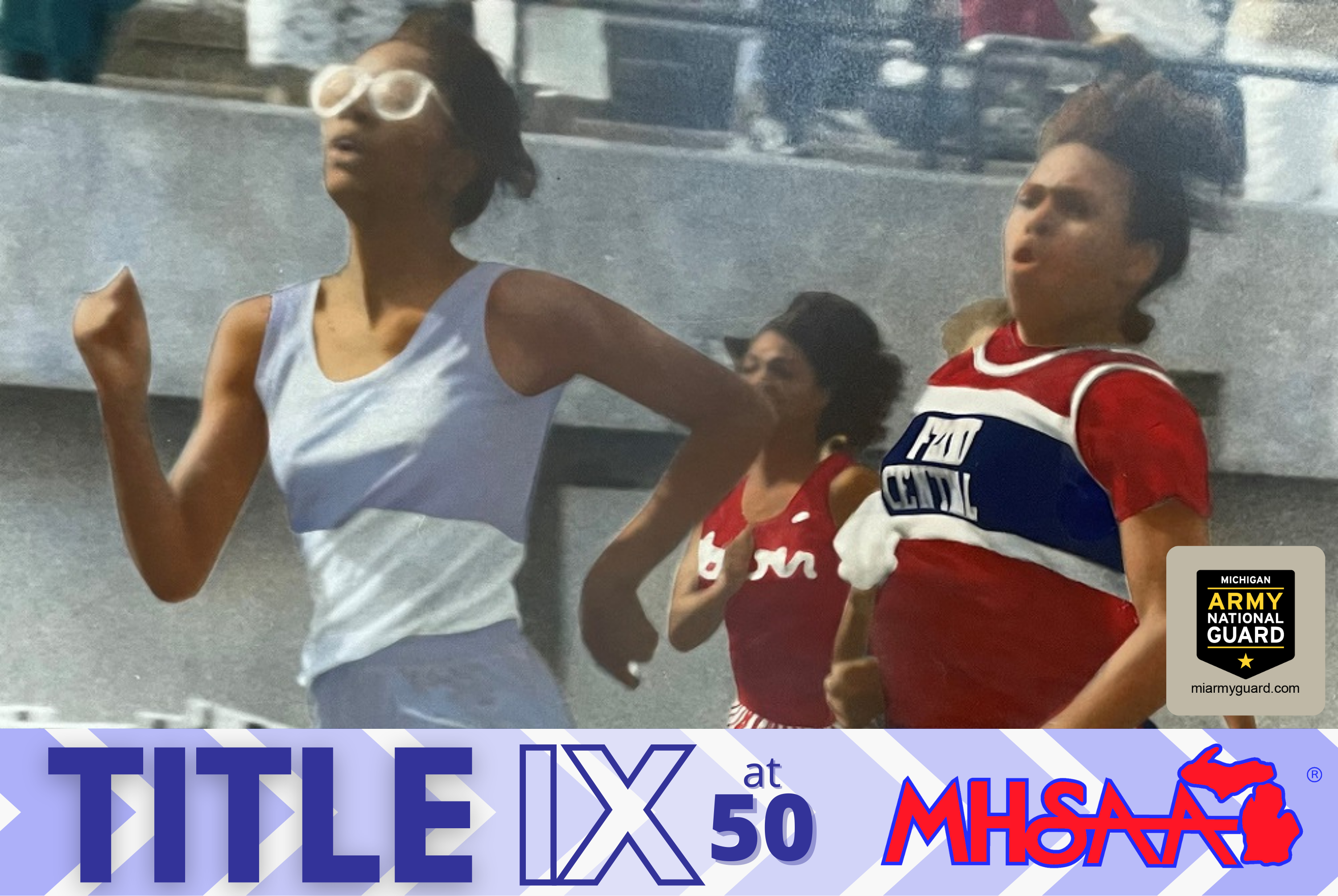
Title IX at 50: Braddock vs. Verdun Still Striding Among All-Time Sprint Matchups
By
Geoff Kimmerly
MHSAA.com senior editor
April 26, 2022
The many who have attended second-floor meetings at the MHSAA Office in East Lansing over the years have at least walked past and hopefully noticed the artistic spin above on a past championship race.
Few may know it depicts one of, if not the most star-studded sprint rivalry in MHSAA track & field history.
On the left is Ann Arbor Pioneer’s Crystal Braddock, with Flint Central’s Patrice Verdun keeping stride. From 1987-89, they met five times in either 100 or 200-meter championship races at Lower Peninsula Class A Finals.
Verdun began her MHSAA Finals run as a freshman in 1986, tying for first in the 100 with Grand Haven’s Michelle Bishop at 12.05 seconds.
A year later, Braddock would join her in the championship heat of that race, finishing seventh (12.47) as Verdun won in 11.98 seconds. Braddock also finished third in 1987 in the 200 (25.12), while Verdun was on the winning 400 relay.
In 1988, the matchup took its first step toward being forever memorable, as Braddock was first and Verdun second in both the 100 and 200. Braddock tied the LP Class A Finals record in the 100 at 11.70, with Verdun just behind her at 11.76 and the next fastest racer at 12.08. It was Braddock first at 24.45 and Verdun second at 24.71 in the 200, with the next fastest after those two crossing the finish nearly a second later. Braddock also ran on the 400 relay champ as Pioneer as a team won its fourth-straight Finals title.
The pair would meet for the last times at an MHSAA Finals in 1989. Again, it was Braddock first and Verdun second in both the 100 and 200. This time the Pioneer sprinter won the 100 in 11.84 to Verdun’s 11.99, and the 200 in 24.90 to her rival’s 25.54. Braddock this time also ran on the winning 1,600 relay, and Pioneer extended its team title streak to five seasons of an eventual seven consecutive as LP Class A champion.
High school track was just the start for the speedy pair. Braddock went on to run at the University of Texas, earning All-America honors four times and helping set a relay record at the World University Games. Verdun earned All-America five times for Florida State University.
And add this in when considering the collective speed of those 100-meter MHSAA Finals races. The third-place finisher in both 1988 and 1989 was Detroit Cass Tech’s Trinette Johnson, who won long jump at both of those meets and also would go on to Florida State – where she was a six-time All-American, including four times in long jump.
Second Half's weekly Title IX Celebration posts are sponsored by Michigan Army National Guard.
Previous Title IX at 50 Spotlights
April 19: Holmes' Strikeout Record Rarely Approached, May Be Unbreakable - Read
April 12: Anticipation High as 45,000 Girls Return to Spring Sports - Read
April 5: Regina's Laffey Retiring as Definition of Legendary - Read
March 29: Edison's Whitehorn named 2022 Miss Basketball - Read
March 22: Carney-Nadeau Sets Girls Hoops Standard with 78-Win Streak - Read
March 15: Binder Among Voices Telling Our Story on MHSAA Network - Read
March 8: 28 Years, Thousands of Cheers - Read
March 1: Kearsley Rolls On Among Girls Bowling's Early Successes - Read
Feb. 22: Marquette Ties Record for Swim & Dive Finals Success - Read
Feb. 15: Jaeger's 2004 Winter Run Created Lasting Connection - Read
Feb. 8: Marian's Cicerone to Finish Among All-Time Elite - Read
Feb. 1: WISL Award Honors Builders of State's Girls Sports Tradition - Read
Jan. 25: Decades Later, Edwards' Legend Continues to Grow - Read
Jan. 18: Iron Mountain Completes Championship Climb - Read
Jan. 11: Harrold's Achievement Heralds Growth of Girls Wrestling - Read
Dec. 20: Competitive Cheer Gives Michigan Plenty to Cheer About - Read
Dec. 14: Evelyn's Game Had Plenty of Magic - Read
Dec. 7: Council Term Ends, But Leinaar Leaves Lasting Impact - Read
Nov. 30: Basketball Season Ready to Add to Rich Tradition - Read
Nov. 23: Marysville Builds Winning Streak Yet to be Challenged - Read
Nov. 16: Wroubel Has Championed Girls School Sports from Their Start - Read
Nov. 9: Pioneer's Joyce Legendary in Michigan, National Swim History - Read
Nov. 2: Royal Oak's Finch Leading Way on Football Field - Read
Oct. 26: Coach Clegg Sets Championship Standard at Grand Blanc - Read
Oct. 19: Rockford Girls Set Pace, Hundreds After Have Continued to Chase - Read
Oct. 12: Bedford Volleyball Pioneer Continues Blazing Record-Setting Trail - Read
Oct. 5: Warner Paved Way to Legend Status with Record Rounds - Read
Sept. 28: Taylor Kennedy Gymnasts Earn Fame as 1st Champions - Read
Sept. 21: Portage Northern Star Byington Becomes Play-by-Play Pioneer - Read
Sept. 14: Guerra/Groat Legacy Continues to Serve St. Philip Well - Read
Sept. 7: Best-Ever Conversation Must Include Leland's Glass - Read
Aug. 31: We Will Celebrate Many Who Paved the Way - Read
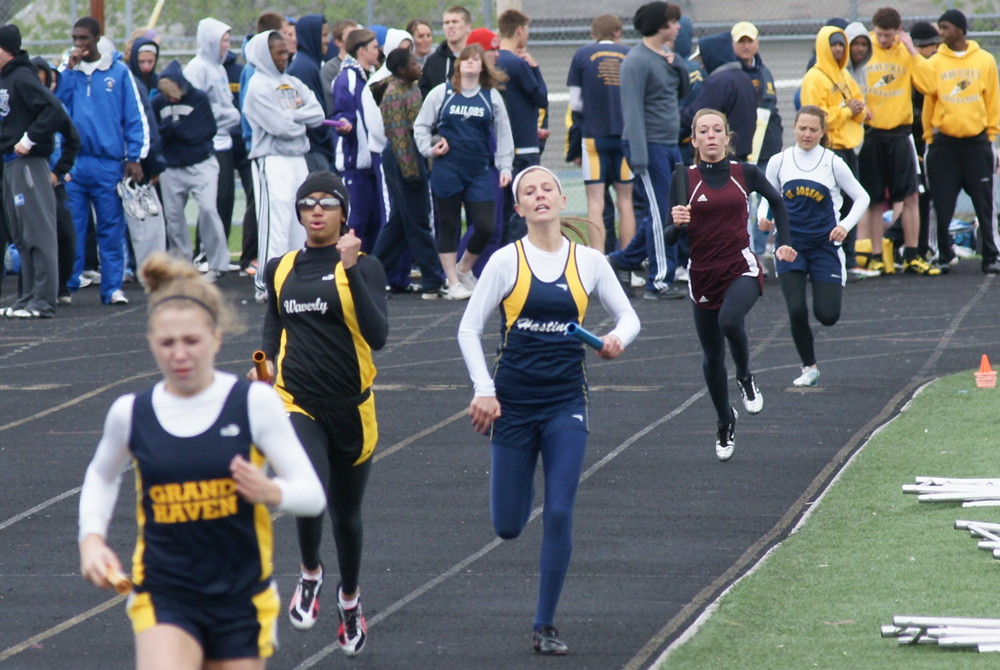
Hastings Relays Reigns as State's Oldest Continuous Track & Field Meet
By
Steve Vedder
Special for MHSAA.com
April 10, 2024
Bob Branch remembers dabbling in other sports, but his first love was always running.
 The Hastings High School graduate admits he could never hit a baseball, football didn't especially appeal to him and basketball was just another way to spend time with friends. But for Branch, now 93, there was always track. That's the sport where his fondest and sharpest memories remain. And if you're talking track, many of his favorite memories come from participation in the state's oldest continuous track meet, the Hastings Relays.
The Hastings High School graduate admits he could never hit a baseball, football didn't especially appeal to him and basketball was just another way to spend time with friends. But for Branch, now 93, there was always track. That's the sport where his fondest and sharpest memories remain. And if you're talking track, many of his favorite memories come from participation in the state's oldest continuous track meet, the Hastings Relays.
Always held in early April, the meet dates back to 1937 – a bygone time that saw the first hostilities of World War II, gas at 20 cents a gallon and a loaf of bread selling for a dime.
And at a dusty old track surrounding the county fairgrounds in Hastings, a small relay event that included a scattering of participants from a dozen high schools was taking its first tentative steps.
Branch recalls a time when kids would run home after track practice because there were no buses, inexperienced young coaches had little actual knowledge of running fundamentals, and athletes looked at the sport as an afterthought after spending most of their high school days playing football and basketball.
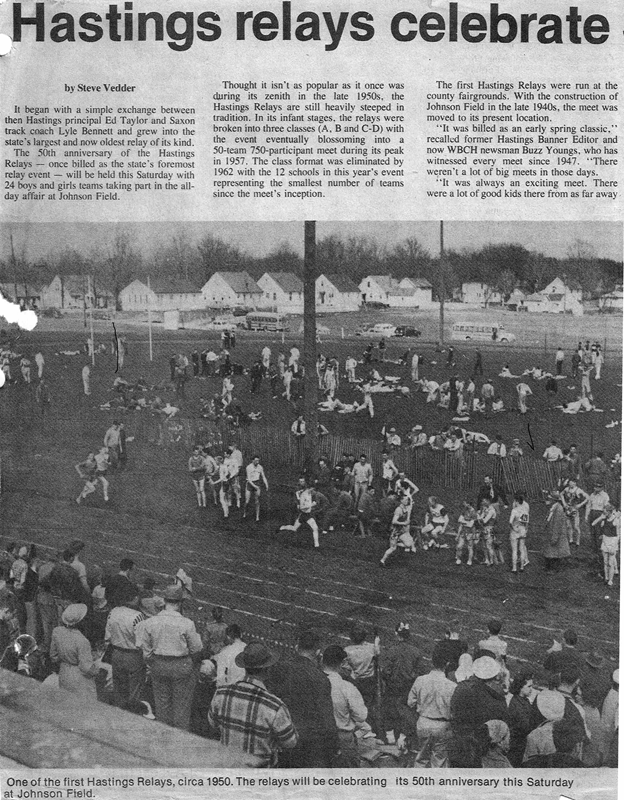 For Branch, the relays were the ideal way to ease into the track season.
For Branch, the relays were the ideal way to ease into the track season.
"I just liked to run," said Branch. "I remember I anchored a relay with my brother, and it always seemed cold when we had that meet. I remember teams would come from all over and you saw a lot of good athletes. Everybody seemed to have someone who was really good. Track wasn't very popular at that time, but I have a lot of good memories from running."
The Hastings Relays, which has changed formats and even names during its nearly nine-decade history, would traditionally kick off the track season. The meet was originally held at a makeshift quarter-mile track which surrounded the town's fairgrounds and was part of the city's annual Hastings Carnival – the track would become the midway during fair time.
The meet eventually moved to Johnson Field when the football field was dedicated in 1949 and ballooned to as many as 50 teams at its peak in 1957. For more than seven decades it was known as the Hastings Relays and then the Hastings Co-Ed relays before becoming the current Hastings Invitational, with the latest edition scheduled for Friday.
Johnson Field had a cinder track before it became an all-weather surface in the 1980s. During a time long before computers would be used to organize meet heats in mere minutes, Hastings coaches of all sports – defined as "volunteers" by the athletic department – would meet on the Friday before competition to hash out events.
People associated with the meet still recall the camaraderie built on those long Friday nights, followed by working what would often become 10-hour meets. Steve Hoke has been involved since watching his father, Jack, who coached teams at 15 of the meets beginning in 1951 and also had run in the first Hastings Relays. Steve Hoke later competed in the Relays as well during the early 1970s before becoming an assistant track coach, later the Hastings athletic director and now a volunteer worker.
"It was always a huge deal," said Hoke, who said the meet began as a pure relay event before transitioning to its current team format in the 1990s. "I remember we'd line the track the night before, and all the coaches would come to the house to organize everything. There was a brotherhood.”
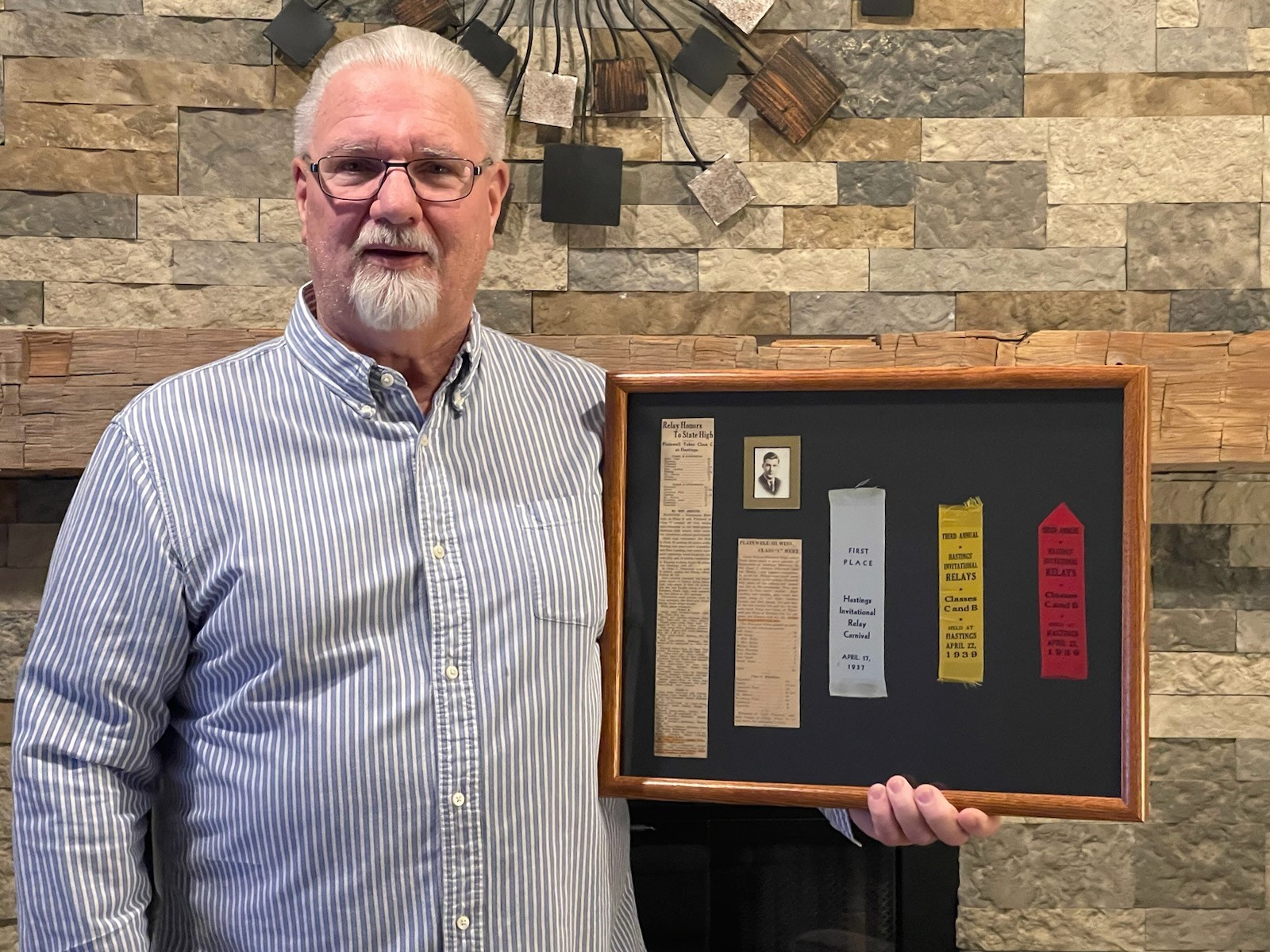 If you quiz many of the fleet of volunteers who've worked the relays over the years, each has a different memory from the meet. While Hoke describes the brotherhood and Branch the outstanding competition, others remember weather and the time a thunderstorm wiped out the line markings on the cinder track, or waking up to find three inches of snow that caused a rare cancellation of the meet. Others recall the shock of moving from the cinder to all-weather track or using the meet as an early measuring stick of what it would take to qualify for the state meet. The real old-timers remember the meet disappearing for three years during World War II.
If you quiz many of the fleet of volunteers who've worked the relays over the years, each has a different memory from the meet. While Hoke describes the brotherhood and Branch the outstanding competition, others remember weather and the time a thunderstorm wiped out the line markings on the cinder track, or waking up to find three inches of snow that caused a rare cancellation of the meet. Others recall the shock of moving from the cinder to all-weather track or using the meet as an early measuring stick of what it would take to qualify for the state meet. The real old-timers remember the meet disappearing for three years during World War II.
Hastings native and Western Michigan grad Tom Duits was the state’s second collegian to break the four-minute mile when he ran a 3:59.2 at a meet in Philadelphia in 1978. Duits, who ran in three Hastings Relays, was in line to join the U.S. Olympic team in 1980 before the United States pulled out of the games due to tension with Russia.
Duits has his own memories of the meet and the competition he faced there.
"I remember sunshine and being excited to be competing again. There were all these athletes swarming around; it was an awesome display of talent," he said. "It was always one of the best meets we'd be in. You could pretty much see the level of runners who would be at state, which made it a big deal. It was always early, but you could tell where you stood. It was great exposure."
Hastings track star Wayne Oom competed in four Hastings Relays from 1984-87. One of his sharpest memories was the difference between running on a raw cinder track versus the far more comfortable all-weather surface.
"Those cinders would grind into your skin," said Oom, part of the Hastings school record in the two-mile relay. "But I think it helped us because when we'd go to other tracks, it seemed we would run faster. I remember how competitive it was, especially in the distances. There were some great runners."
While participants have their unique memories, so do coaches. Former Saxons coach Paul Fulmer remembers 2008 when his team finished first on the boys side of the meet while his wife, Grand Haven coach Katie Kowalczyk-Fulmer, saw her girls team win the championship.
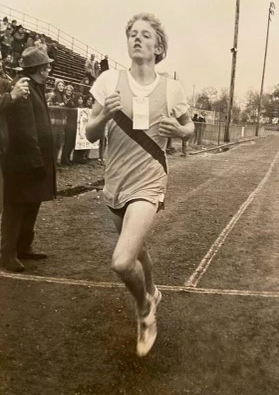 "I knew we were one of the favorites to win because we were usually near the top of our conference and Regional," he said. "But then Katie's team was pretty good, and it was cool for them to win too."
"I knew we were one of the favorites to win because we were usually near the top of our conference and Regional," he said. "But then Katie's team was pretty good, and it was cool for them to win too."
Fulmer, who coached Hastings from 1978-81 and then 1985-2010, said at least part of the meet's popularity was derived from a unique way of scoring. Instead of individuals earning points solo, participants worked in pairs. For instance, two athletes would combine their shot put or long jump scores. New events such as the 1,500 relay and sprint medley were added.
"We had a tradition of being the state's oldest meet, and that was a big deal," Fulmer said. "And we ran a good relay; that attracted teams too. We took a lot of pride in that.
"And we'd get quite a lot of people to come to the meet. We'd set up until like 9 or 10 p.m., and then we'd have a party with all the coaches on Friday night."
While the meet has stretched 87 years, Branch said early participants and current runners have one thing in common: a drive to win. Branch ran in an era when the popularity of high school track was in its infancy. Today some of the best all-around athletes at a school are involved in the track program. The relays span the nearly nine decades in between.
"The quality of teams has gotten better and better," said Branch, the 1947 Lower Peninsula Class B Finals champ in the 220. "And this has made for a better meet. We would get guys who played football or baseball kind of drift into track, and that made the sport better. I think people began to appreciate track because we'd get teams from all over.
"We went from not really knowing what we were doing to track being a good sport. Even then, I'm not sure we appreciated what we had. We really liked the Hastings Relays and always wanted to do well there. It became popular and quite an honor to do well. Those are the kind of things I remember."
PHOTOS (Top) Racers run at the Hastings Relays, with several more awaiting their turns to compete at the longtime meet. (2) The author wrote on the 50th anniversary of the Relays for the Hastings Banner nearly 40 years ago. (3) Past athlete, coach and athletic director Steve Hoke shows some of the Relays awards from the 1930s. (4) Tom Duits was one of the state’s biggest track stars of the 1970s and ran in three Hastings Relays. (Top photo by Dan Goggins, Hoke photo provided by Steve Hoke and Duits photos provided by Tom Duits.)

